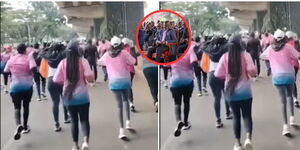Three Kenyans were sentenced to death for stealing 30 pineapples from the Thika-based Delmonte farm.
On Monday, Court of Appeal judges Roselyne Nambuye, Patrick Kiage and Kathurima M’inoti upheld the death sentences handed to Julius Mugambi, Edward Mburu, and Francis Maina after they were positively identified as part of a gang of seven intruders.
The three unsuccessfully tried to steal the fruits worth Sh1,500 but were nabbed by a guard dog as they attempted to escape after being spotted by personnel manning the firm.
In addition, the men were charged with threatening security guards using machetes and unlawfully injuring an animal. They had attempted to kill the sniffer dog using a machete.
The case was first heard in a magistrate's court in Thika on November 1, 2008, where they were tried and sentenced to death.
They challenged the ruling in the High Court arguing that there was a mistake in the identification of intruders at the farm.
The prosecution, however, submitted that the trained guard dog was capable of sniffing and sensing that they were the intruders on the farm.
During the hearing, the dog handler, David Kamau, testified that he released the trained animal when the intruders defied his orders to stop.
He confirmed that each of the suspects had a dog bite adding that they were armed with a sword and a machete.
Upon hearing the evidence presented in court, the three-judge bench ruled that although the evidence given on behalf of the animal by its handler should be taken with a pinch of salt, it could be admitted as opinion evidence.
“The evidence of tracker dogs may be admissible in certain circumstances. A dog handler is competent to testify as to the tracking ability and reliability of the dog,” the judges ruled.
“The dog handler testified that his dog was trained in a manner that when it sensed the presence of intruders, it usually stood on the pineapples... For that reason, it can be safely concluded... that the scent led to the bush where the appellants entered,” the court ruled.












